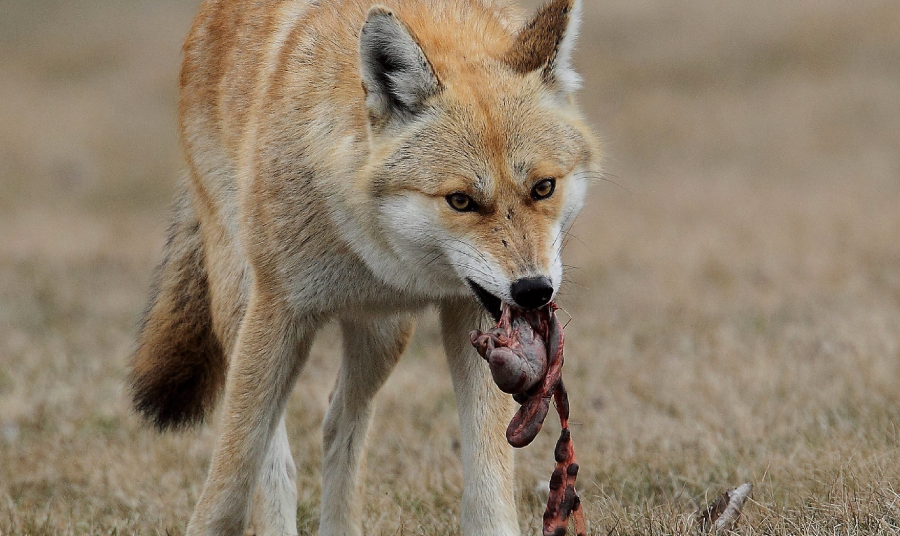Photo credit: Steve Rossi
Eating coyote might sound like something done out of sheer desperation on an episode of a survivalist TV show, which is why for most of us, song dog sauteed in garlic butter sauce is a hard pass. While celebrity outdoorsmen like Steven Rinella and Remi Warren have famously cooked and consumed coyote, their reviews ranged from “not unpleasant” to admitting that it tasted much like it smelled: musky and pungent. This raises the question: why exactly is eating coyote frowned upon?
You Are What You Eat
Coyotes are opportunistic feeders. Their diet includes small mammals like rabbits and squirrels, fish, livestock, and an alarming amount of carrion. Coyotes are scavengers, often feasting on rotting flesh, garbage, and anything else they can find. This diverse and sometimes unsavory diet can lead to the accumulation of harmful bacteria and toxins in their meat.
Due to their diet, one of the major concerns with eating coyotes is the potential for disease. Coyotes can carry trichinosis, a parasitic disease that can be transmitted to humans through the consumption of undercooked meat. This disease, along with other parasites and bacteria found in scavenged food, poses a significant health risk.
Man’s Best Friend’s Wild Cousin
In Western culture, the idea of eating dogs is met with strong revulsion and is considered a social and culinary taboo. This is because, to put it briefly, “dogs are friends, not food.” As a result, the thought of consuming a creature so closely associated with loyalty and friendship is deeply unsettling to many people.
Coyotes, as members of the Canidae family, inherit this stigma by association. The coyote may be the most reviled large mammal in North America, but it looks close enough to Rover or Fido that the idea of eating it may give some people pause.
The Taste Factor: Not Exactly Gourmet
Even if you can get past the health risks and cultural taboos, there’s the matter of taste. Coyotes reportedly have a gamey, musky undertone that many find off-putting. Outside the United States, in other regions where canids are hunted, such as parts of Western Europe where wolves are hunted for the same reason as coyote, wolf meat is generally avoided. Just like coyote flesh, wolf is not considered good table fare, since their meat is often described as tough and unappealing, further dissuading people from consuming them. A similar aversion can be found when considering other land-based predatory animals. For example, the Maasai, the famous tribe of African hunters and herdsmen, whose diet consists primarily of meat, refuse to eat the lions they kill.
Predators, Not Prey
Another big reason we don't eat coyotes is because they're not really hunted for their meat at all. Farmers see coyotes as their arch-nemesis, constantly threatening their livestock. When farmers or ranchers go after coyotes, it’s not to bring home dinner but to protect their animals from a serious predator. Coyotes can wreak havoc on a farm, killing chickens, sheep, and even young calves, so they’re often hunted to keep these threats in check.
Think of it this way: just like we don't harvest roaches or locusts for a meal, we don't hunt coyotes with the idea of eating them. Sure, there might be some wild recipes out there for locusts, but most of us aren’t lining up to try them. Coyotes fall into that same category. They’re seen more as pests that need to be controlled rather than a viable food source.
When it comes down to it, the idea of eating coyotes just doesn’t align with why they’re hunted in the first place. The primary goal is to protect livestock and reduce the threat these crafty predators pose. It’s a practical solution to a real problem, and turning them into a meal isn’t part of the equation.
The Bottom Line: Why We Don’t Eat Coyote
Eating coyote isn’t just about personal taste preferences; it’s about health, culture, and practicality. Their diet makes them a risky food source, capable of harboring diseases harmful to humans. Cultural taboos against consuming canids further cement the idea that coyotes are not food. And practically speaking, they are hunted more for pest control than for nourishment. So, while some adventurous eaters might be willing to give coyote a try, for most of us, it’s a firm “no thank you.”
If our products have helped you in any way, share your story with us! Accepted stories will receive a 20% discount code.
FAQs
Why is eating coyote frowned upon?
Coyotes can carry diseases such as trichinosis due to their scavenging diet.
Why is eating dogs taboo in Western culture?
Dogs are considered friends, not food, leading to a strong cultural aversion.
What does coyote meat taste like?
Coyote meat has a gamey, musky undertone that many find unappealing.
Why are coyotes not hunted for their meat?
Coyotes are seen as predators, not prey, by farmers and ranchers.
Is eating coyotes common in other regions?
In other regions, similar predators like wolves are also generally avoided as food.





